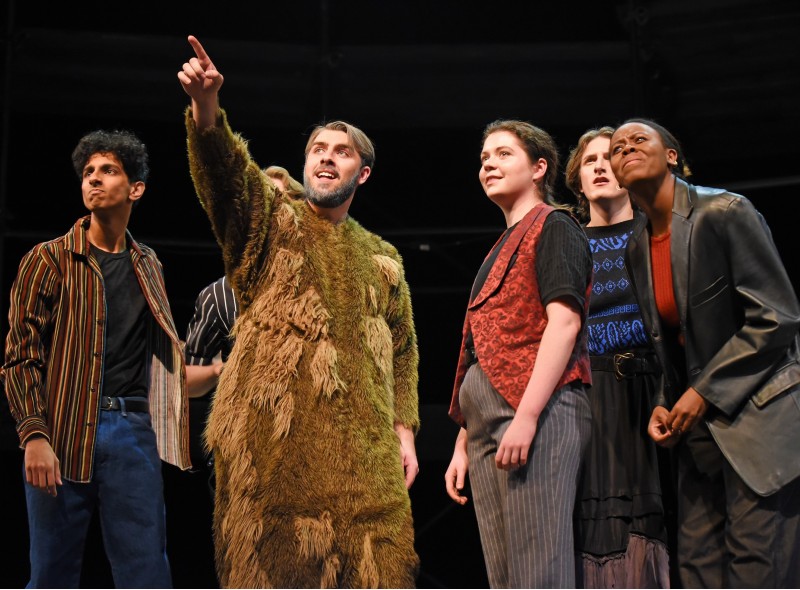Much Ado: U-M Theatre's "Imogen Says Nothing" bears bizarre and haunting moments

U-M theater professor Malcolm Tulip has long established a reputation for bringing challenging, provocative productions to local stages, going back to his days as a director (and performer) at the sadly defunct Performance Network Theatre.
So it was no surprise to find Tulip at the helm of the U-M theater department’s strange, darkly haunting production of Aditi Brennan Kapil’s Imogen Says Nothing, mounted at the Power Center this past weekend. Inspired by a character, Imogen, who has no lines, but is nonetheless mentioned in the first folio edition of Shakespeare’s Much Ado About Nothing, the play imagines a woman who fights to perform on stage in Shakespeare’s time, when only men played theatrical roles (by law!), and campaigns to appear in the first written version of the play, too.
Plus, there are bears.
Imogen is a former bear (!) who has escaped the bear-baiting arena next to the Globe Theatre, which hearkens back to one of Shakespeare’s most famous stage directions, in The Winter’s Tale: “Exit, pursued by a bear.”
While enmeshed with a troupe of actors, Imogen confronts her former peers, and the line that encapsulates the play, “It is a lonesome thing to be absent,” further expands its meaning.
With a running time of two hours and 20 minutes (and two 10-minute intermissions), the play builds slowly. Much of the first act consists of Imogen (Brynn Aaronson) meeting two players in the troupe, Henry (Rohan Maletira) and the always-drunk John (Ben Henchman), and explaining she’s going to London to advocate for the reinstatement of her hometown’s original name on a map. (As dramatic hooks go, it's not the strongest.)
Upon meeting the rest of the crew, including Shakespeare (Maya McEntyre), Imogen soon volunteers to prop up inebriated John on-stage by standing in as Leonato’s wife, but the actors worry they might be arrested, so they make Imogen promise not to say a word. Even so, once Imogen gets a small taste of being on stage, she immediately hungers for more.
At this first intermission point, a handful of attendees left Friday night’s performance, and in fairness to them, I will say this: I wasn’t feeling terribly invested then, either. However, the weirder Kapil’s play got in its later acts, the more it drew me in.
The second act is largely focused on the captive bears, who are reluctant entertainers for the theater troupe (and humanity in general). A blind elder bear named Harry Hunks (Mary-Kate Sunshine Mahaney) acts as leader, but they are all under the control of a ringmaster-like Crier (Zack Gergel), who quickly recognizes Imogen as an escapee.
A bizarre turn of events, yes. But the sheer sense of “I have no clue where this is going” woke me from my first act blahs, as did an earned moment of savagery in the play’s final moments.
The production’s apocalyptic look and feel made it clear that we were in a funhouse mirror version of Elizabethan England. This is a fallen world, which is why the playful antics of two bear cubs (Izzy Chilian and Constance Meade) in the second act were welcome, joyful bits of relief.
Jess Fialko’s spooky lighting design, paired with Vince Mountain’s spare, scaffold-rimmed backdrop, established this bleak visual tone, while Matthew Eggers' contemporary, casual costumes ensured that we brought our current-zeitgeist sensibilities (regarding gender, race, identity, etc.) to Kapil’s play. Plus, dressing the bears not literally, but in ripped-up puffy coats, was a truly inspired design choice.
Brittany Crinson’s hair and makeup subtly underscored truths about these characters, including Imogen’s bear-ear-like double topknot and Harry’s black-encircled eyes. And up high on the set’s scaffolding was Harry Beau, the drummer in a bear suit that added some whimsy, along with occasional narrative tension, by way of the skins.
The production had a uniformly strong ensemble, but Aaronson earns special mention, skillfully playing an outcast of two worlds who must still be able to pass within each. Imogen must thus be primal but also human, and Aaronson strikes this balance with impressively fierce abandon.
Imogen Says Nothing is not likely to become a show that’s often produced, or embraced by the mainstream; nor is it without flaws. Like many shows that address Big Questions, it prioritizes its politics over storytelling.
Yet it’s rare for me to note, at this point in my career, that a show is unlike anything I’ve seen in a theater before; and it strikes me that more often than not, when I can say that, Tulip is in some way involved. I appreciate that.
Jenn McKee is a former staff arts reporter for The Ann Arbor News, where she primarily covered theater and film events, and also wrote general features and occasional articles on books and music.


































